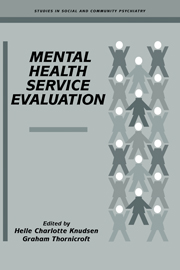Book contents
- Frontmatter
- Contents
- List of contributors
- Foreword
- Preface
- Part I INTRODUCTION
- Part II COMPREHENSIVE SERVICE EVALUATION PROJECTS
- Part III METHODS: MEASUREMENT, STRATEGIES AND NEW APPROACHES
- 8 Strategies of measurement and analyses
- 9 Experimental and quasi-experimental design in evaluative research
- 10 An informal introduction to graphical modelling
- 11 Meta-analysis
- Part IV SYSTEM-LEVEL RESEARCH
- Part V PROGRAMME-LEVEL RESEARCH
- Part VI HEALTH ECONOMICS IN MENTAL HEALTH
- Index
9 - Experimental and quasi-experimental design in evaluative research
from Part III - METHODS: MEASUREMENT, STRATEGIES AND NEW APPROACHES
Published online by Cambridge University Press: 05 August 2016
- Frontmatter
- Contents
- List of contributors
- Foreword
- Preface
- Part I INTRODUCTION
- Part II COMPREHENSIVE SERVICE EVALUATION PROJECTS
- Part III METHODS: MEASUREMENT, STRATEGIES AND NEW APPROACHES
- 8 Strategies of measurement and analyses
- 9 Experimental and quasi-experimental design in evaluative research
- 10 An informal introduction to graphical modelling
- 11 Meta-analysis
- Part IV SYSTEM-LEVEL RESEARCH
- Part V PROGRAMME-LEVEL RESEARCH
- Part VI HEALTH ECONOMICS IN MENTAL HEALTH
- Index
Summary
Depending on the processes being assessed, the term ‘evaluative research’ is used for different approaches (Milne, 1987): ‘effort evaluation’ examines the relationship between the characteristics and activities of a programme or service (e.g. physician-patient ratio, utilisation of beds) and the money spent on it (e.g. for staff and equipment); ‘process evaluation’ is traditionally limited to a simple outline of services over time (number of patients, type and extent of services offered); ‘efficiency evaluation’ establishes the relationship between the cost of a service and the goal it aims to achieve; ‘client satisfaction evaluation’ examines the patients’ acceptance of treatment measures. ‘Outcome evaluation’ is the core of evaluative research; here, the result of a measure is the focus of the study. This approach is chosen when the effectiveness of interventions or services is to be examined. Outcome evaluation relates most directly to the primary goal of treatment, ‘which is to make the patient better’ (Schwartz et al.1973).
In a mental health care system many events occur at the same time. So at first sight it seems rather arbitrary to assume that of all things happening one event ‘treatment’ is causally related to another event ‘outcome’, for example absence or presence of schizophrenic symptoms at a given point in time. Many factors besides treatment may influence psychopathological status. It is well known that the mere incidence or correlation of two events does not tell anything about which is the cause and which is the effect, whether two events are mutual interdependent or whether they are both dependent upon an unknown third variable (Simon, 1976). Chains of cause and effect are not observable in principle; it is also impossible to verify a causal relationship empirically. The testing of a causal hypothesis rather results by ruling out rival explanations for an effect (Kraak, 1966; Cook & Campbell, 1979).
According to Kenny (1979) three commonly accepted conditions must hold for a scientist to claim that the event X causes the event Y:
Temporal precedence of the cause: for X to cause Y, X must precede Y in time; such temporal precedence means a causal relationship is asymmetric.
- Type
- Chapter
- Information
- Mental Health Service Evaluation , pp. 143 - 155Publisher: Cambridge University PressPrint publication year: 1996



